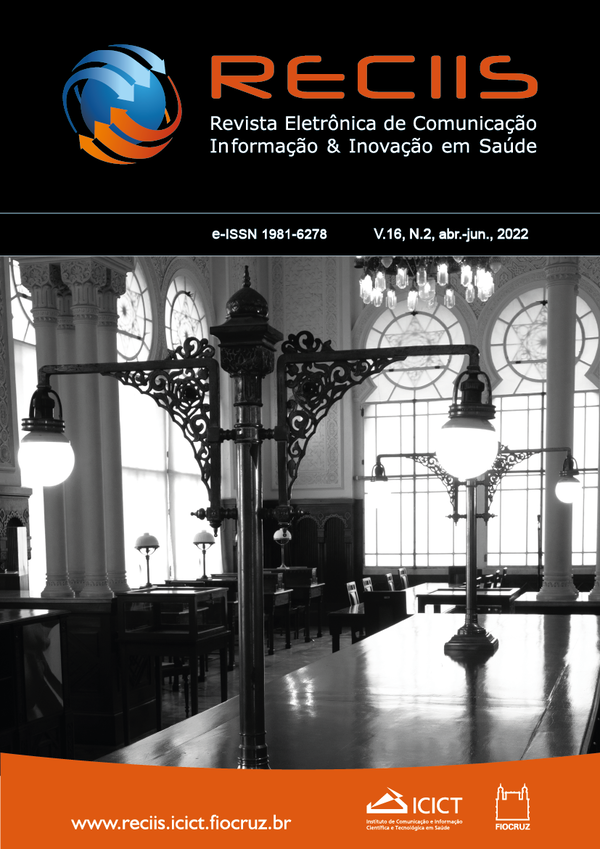Disinformation versus democracy: the relationships between journalism, science and health in the promotion of a democratic life
DOI:
https://doi.org/10.29397/reciis.v16i2.3347Keywords:
Communication, Information, Media, Social networks, Portugal.Abstract
In an interview to Reciis, João Figueira comments on his work, for more than 20 years, as a journalist in some of the main Portuguese newspapers and on his path as a researcher, considering it an extension and a passion for journalism. The researcher talks about an issue that he categorically says is not new: the misinformation. However, he specifies it on contemporaneity, considering the way misinformation circulates, given the emergence of online social networks. Contents spread in a faster and more fragmented way by an economy of emotions. Values and beliefs override evidences. João Figueira claims that journalistic practice has followed the same dynamics of online social networks, losing its importance and making him question: “Why do people want the news? How important are the news in people’s lives?”. Journalism, health and scientific research are strongly coupled up to democratic governments. The contemporary world poses us a great challenge: a democratic life. João Figueira is professor of Journalism at the Faculty of Arts of the University of Coimbra.
References
ALEXANDRE, Ilo; YOO, Joseph Jai-sung; MURTHY, Dhiraj. Make tweets great again: who are opinion leaders, and what did they tweet about Donald Trump? Social Science Computer Review, Londres, p. 1-22, 2021. DOI: https://doi.org/10.1177/08944393211008859. Disponível em: https://journals.sagepub.com/doi/full/10.1177/08944393211008859. Acesso em: 06 jun. 2022.
BAKIR, Vian; MCSTAY, Andrew. Fake news and the economy of emotions: problems, causes, solutions. Digital Journalism, Londres, v. 6, n. 2, p. 154-175, 2017.
FAIRHURST, Gail T.; PUTNAM, Linda. As organizações como construções discursivas. In: MARCHIORI, Marlene. (org.). Comunicação e organização: reflexões, processos e práticas. São Caetano do Sul: Difusão, 2010. p. 102-148.
FIGUEIRA, João. O acontecimento que quer ser notícia: a construção de sentido das Organizações através dos media – O caso A Vida é Bela. 2014. 461 f. Tese (Doutoramento em Letras) – Universidade de Coimbra, Coimbra, 2014.
FIGUEIRA, João. Os jornais como actores políticos: o Diário de Notícias, Expresso e Jornal Novo no verão quente de 1975. Coimbra: Minerva Coimbra, 2007.
FIGUEIRA, João; SANTOS, Sílvio (org.). As fake news e a nova ordem (des)informativa na era da pós-verdade. Coimbra: Imprensa da Universidade de Coimbra, 2019a.
FIGUEIRA, João; SANTOS, Sílvio. Percepción de las noticias falsas en universitarios de Portugal: análisis de su consumo y actitudes. El Profesional de la Información, Léon, v. 28, n. 3, p. e280315. 2019b. DOI: https://doi.org/10.3145/epi.2019.may.15. Disponível em: https://revista.profesionaldelainformacion.com/index.php/EPI/article/view/epi.2019.may.15. Acesso em: 06 jun. 2022.
GILLMOR, Dan. Nós, os media. Lisboa: Editorial Presença, 2005.
LIBERDADE. Compositor: Sérgio Godinho. Intérprete: Sérgio Godinho. In: À queima roupa. Intérprete: Sérgio Godinho. Lisboa: Guilda da Música, 1974. 1 disco vinil, lado A, faixa 1 (3:16 min).
MARCHIORI, Marlene et al. Comunicação e discurso nas organizações: construtos que se relacionam e se distinguem. Comunicação & Sociedade, São Bernardo do Campo, v. 32, n. 54, p. 211-238, 2010. DOI: https://doi.org/10.15603/2175-7755/cs.v32n54p211-238. Disponível em: https://www.metodista.br/revistas/revistas-ims/index.php/CSO/article/view/1960. Acesso em: 06 jun. 2022.
MESQUITA, Mário. Os meios de comunicação social. O universo dos media entre 1974 e 1986. In: REIS, António (coord.). Portugal: 20 anos de democracia. Lisboa: Círculo de Leitores, 1993. p. 360-405.
MOLOTCH, Harvey; LESTER, Marilyn. As notícias como procedimento intencional: acerca do uso estratégico de acontecimentos de rotina, acidentes e escândalos. In: TRAQUINA, Nelson. (org.). Jornalismo: questões, teorias e “estórias”. Lisboa: Veja, 1993. p. 34-53.
MUMBY, Dennis K.; MEASE, Jennifer. Organizational discourse. In: DIJK, Teun A.V. (ed.). Discourse studies: a multidisciplinary introduction. Londres: Sage, 2011. p. 283-302. DOI: https://dx.doi.org/10.4135/9781446289068.n14.
ORGANIZACIÓN DE LAS NACIONES UNIDAS PARA LA EDUCACIÓN, LA CIENCIA Y LA CULTURA (UNESCO). Periodismo, libertad de prensa y covid-19. Paris, Unesco, 2020. Disponível em: https://en.unesco.org/sites/default/files/unesco_covid_brief_es.pdf. Acesso em: 06 jun. 2022.
PESSOA, Fernando. Páginas íntimas e de autointerpretação. Lisboa: Edições Ática, 1966.
ROSS, Andrew S.; RIVERS, Damian J. Discursive deflection: accusation of “fake news” and the spread of mis- and disinformation in the tweets of President Trump. Social Media + Society, Londres, v. 4, n. 2, p. 1-12, 2018. DOI: https://doi.org/10.1177%2F2056305118776010. Disponível em: https://journals.sagepub.com/doi/10.1177/2056305118776010. Acesso em: 06 jun. 2022.
SCHLESINGER, Philip. Putting “reality” together: BBC News. Londres: Methuen, 1978.
TORGA, Miguel. Diário. Lisboa: Publicações Dom Quixote, 1999. v. IX-XVI.
TUCHMAN, Gaye. Making News: a study in the construction of reality. Nova York: Free Press, 1978.
WARDLE, Claire; DERAKHSHAN, Hossein. Information disorder: toward an interdisciplinary framework for research and policy making. Estrasburgo: Council of Europe, 2017. Disponível em: https://rm.coe.int/information-disorder-toward-an-interdisciplinary-framework-for-researc/168076277c. Acesso em: 06 jun. 2022.
WEICK, Karl E. Sensemaking in organizations. Thousand Oaks: Sage, 1995.
Downloads
Published
How to Cite
Issue
Section
License
Author’s rights: The author retains unrestricted rights over his work.
Rights to reuse: Reciis adopts the Creative Commons License, CC BY-NC non-commercial attribution according to the Policy on Open Access to Knowledge by Oswaldo Cruz Foundation. With this license, access, download, copy, print, share, reuse, and distribution of articles is allowed, provided that it is for non-commercial use and with source citation, granting proper authorship credits and reference to Reciis. In such cases, no permission is required from the authors or editors.
Rights of authors’s deposit / self-archiving: The authors are encouraged to deposit the published version, along with the link of their article in Reciis, in institutional repositories.












